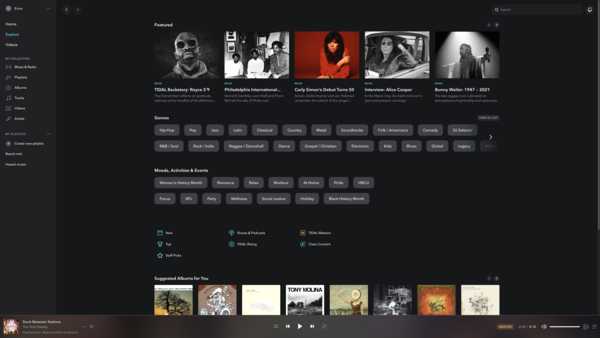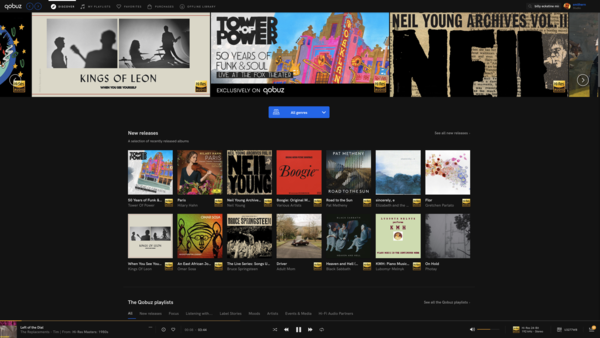
The video in which artists got equity in Tidal.
For years, I was that guy. The guy who pitched hard for Tidal when everyone else was enjoying their music on Spotify and Apple Music. And I still think it’s an amazing service.
And given the headlines I’ve seen in the past week after Jack Dorsey announced Square’s deal to take primary ownership of the service, I feel like it deserves a little bit of defense—or at least, an explanation of what I liked about it.
The way I was introduced to Tidal was this: I bought a pair of headphones (Sennheiser PXC 550s, if you need to know), and was encouraged to check out Tidal based on a discount they offered, with the idea that the service’s master-quality recordings might suck me in.
And honestly, they did. The album that got me hooked was Automatic for the People, a longtime favorite of mine. Listening to the atmosphere in “Drive,” the first track of the R.E.M. album, just felt like a significantly more open experience on my nice headphones than I could muster on Apple Music. It’s a good song to understand the “space” your music takes up because it’s not a “full” song, jamming every bit of space with noise.
While pitching itself as a way for artists to make money, the Jay Z-owned music service, which famously gave a number of major artists equity in the company, really needed users like me, users that would make the choice to go with the high-end option because it was a better choice than Spotify or Apple Music.
Problem is, there are only so many of those users. The “Pono class” of music fans, the ones who care about fidelity in music quality, is a fairly small audience. (Pono rips aside, Neil Young figured this out, and now makes bank by catering specifically to them.) And even in my case, I’m only slightly more of music quality nerd than the average person is.
The thing is, as well, music has always been a young people’s game. Recently, YouTube-famous music producer and instructor Rick Beato has been taking a listen to the most popular songs on Spotify, and those songs aren’t like the kinds of things that a music fan who cares about “master-quality” recordings would really care about. By putting a focus on quality over every other metric, Tidal ultimately relegates itself to a niche.
The problem I found with Tidal, as a listener, was that the curation didn’t seem to match the message that its high-res music did. It felt like, even though the pitch was high-quality music, it was selling me the same kinds of modern tracks that would appear on Spotify, which was both cheaper and more technically impressive. (Case in point on that latter issue: Try installing Tidal on Linux; see how easy it is. I promise you, it is not easy.)
I think that one way Tidal could have found its lane is by leaning even harder into that music nerd niche. A competitor of Tidal’s that I’ve been checking out lately, Qobuz, offers a great example of what this might look like. Compare the explore page of Tidal to that of Qobuz:

I last listened to “Stuck Between Stations” on Tidal.
Tidal’s page has greatly improved. It used to look a lot like Spotify, pitching really mainstream stuff. Now, it seems to have realized that, as someone who listens to a lot of indie rock and vintage/obscure stuff, I don’t care about any of that.

I last listened to “Left of the Dial” on Qobuz.
Qobuz, meanwhile seems to encourage you to explore what its high-quality recordings can offer you. There is mainstream stuff in there, but it’s also trying to sell you on not-mainstream stuff or some deep catalog stuff. It feels like a service for audiophiles, rather than one built for mainstream users. (It also pays more than Tidal does, an early pitch of the Jay Z-owned service.) This is the lane Tidal should be in, as the one selling you on lots of different types of music that never get played on the radio. And I think the company has only really figured that out recently.
Last fall, I wrote about the concept of “superfans,” the music enthusiasts who will sustain the industry by maximizing value to individual artists. Tidal’s plan to move towards merch under Square will likely help with that. But really what Tidal should be doing is leaning hard on the obscure artists those master-quality listeners are into. The music industry has a lot more obscure artists than superstars—and they deserve to make money, too.
Tidal is not going to grow into Spotify, but there’s plenty of time for it to evolve into something more like Qobuz. Honestly, I’m leaning toward cancelling my Tidal subscription in favor of Qobuz, because I don’t want to wait for someone to figure the model out.
Time limit given ⏲: 30 minutes
Time left on clock ⏲: alarm goes off

